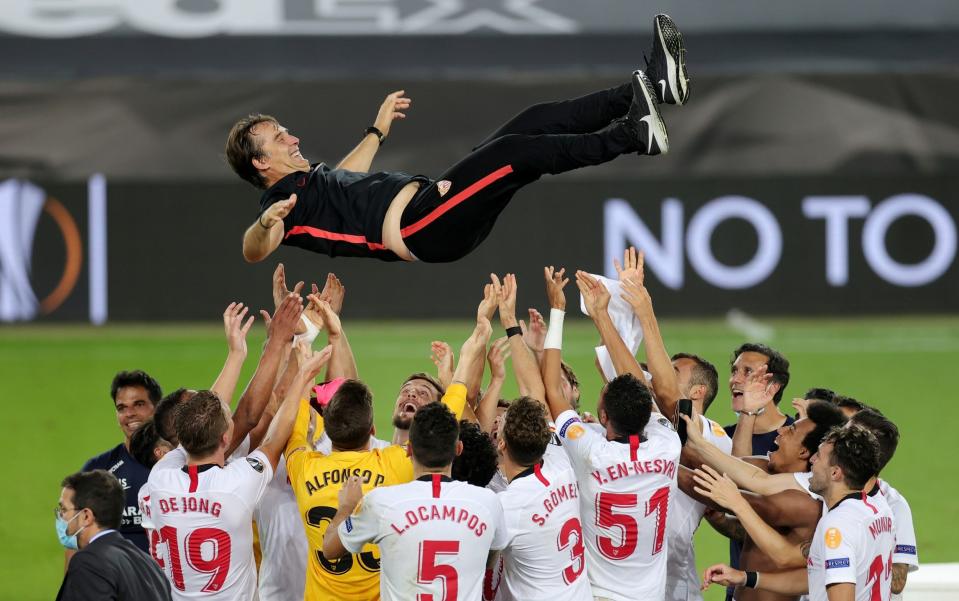Why Spaniards dream of managing in England – and it is not just money
The way Javi Gracia tells it, there was only one call he really wanted to take and only one country where he really wanted to work. He had sampled English football during his time at Watford and, after a few years away, he was desperately hoping to come back to these shores.
“I was waiting for something in the Premier League,” the Spaniard said last month, shortly after his appointment as head coach at Leeds United. “When I finished at Watford, I didn’t know if I’d have another experience in the Premier League. It was what I was waiting for.”
Gracia, clearly, is not alone. The Premier League has never been more appealing to foreign players and coaches, and it is a measure of its dominance of the global game that so many leading Spanish managers are now turning their backs on La Liga in pursuit of a life in England. Of the Premier League’s current managers, six are from Spain – Pep Guardiola (Manchester City), Mikel Arteta (Arsenal), Unai Emery (Aston Villa), Julen Lopetegui (Wolves), Rubén Sellés (Southampton) and Gracia (Leeds).
Never before has a non-British nation had so many coaches working here, at the same time in the same Premier League season. The previous record was five managers from one foreign country, which was also Spain, in the 2019-20 campaign. From a Spanish perspective, it must be considered a brain drain. Especially when coaches like Emery and Lopetegui have chosen to join mid-table or low-ranking Premier League sides so soon after winning European trophies (Lopetegui won the Europa League in 2020, before Emery won it for the fourth time in 2021).

Emery, after all, was a Champions League semi-finalist with Villarreal less than a year ago. He left them for Villa when the Midlands side were 14th. Lopetegui, meanwhile, is a former Porto, Spain and Real Madrid manager – and he chose to join Wolves when they were 19th. So why is it happening? And, perhaps even more interestingly, what does it say of the current state of the English game?
The first point to make is the most obvious and least romantic: money. The Premier League has more of it than anyone else, and its clubs can offer more of that cash to their managers. The Deloitte Football Money League 2023 showed that, for the first time ever, more than half of the top 20 revenue-generating clubs in world football herald from one country: England.
In the top 30, meanwhile, there are 16 English clubs and only five from La Liga. As Deloitte’s analysts put it: “In the short term, the revenue superiority of English clubs is unlikely to be challenged and one now has to question whether it will be long before we see all 20 Premier League clubs in the top 30.”
Telegraph Sport spoke to a number of sources in Spain about the difference between the two leagues, and the appeal of Premier League football to Spanish coaches. All of them referenced the financial disparity, not just in terms of a coach’s salary but also in terms of a club’s willingness to invest in players and projects. But there are stylistic factors to consider, too. The English game has changed dramatically over the past decade, and many of those changes have been accelerated by the arrival and subsequent success of Guardiola at City.
The Pep Guardiola effect
He has conquered Premier League football with the most extreme possession-based, Spanish style of play that England has ever seen, and he has shown the rest of the world that such an approach really can bring success in the land of the long ball. Not so long ago, it was a widely held view that this style – the style of play that most Spanish coaches have grown up with – would not work in the physical world of English football.
Guardiola has emphatically disproved this theory, to such an extent that almost every Premier League club now looks to build play from the back and dominate possession. In the six seasons before Guardiola’s arrival at City, Premier League clubs played an average of 869 passes per game. In the six and a half seasons since Guardiola’s appointment, that figure has risen to 912 per game. The percentage of long passes has dropped, as has the number of crosses from open play.
The best illustration of this ‘Spanishification’ of the league can be seen in the demands placed on modern goalkeepers. In the six years before Guardiola joined City, Premier League goalkeepers played long passes 80 per cent of the time. In the six years since, that percentage has plummeted to 63 per cent. Truly, Guardiola has helped to change the English game.
Off the pitch, the atmosphere at matches and the passion of the supporters is regarded by many to be more intense, overall, in England than in Spain. The speed of the games, and the quality of the players, makes it a more appealing environment for viewers, players and coaches. There is also a feeling among some informed observers that the average Premier League club is more ambitious, in terms of its project and its plans, than the average La Liga club.
Again, the money helps in this regard. “My Super League is the Premier League,” said Emery earlier this season. “The best league in the world,” said Sellés in the summer. “It is the best competition in the world,” said Lopetegui following his appointment at Wolves.
For the rest of Europe, and Spain in particular, it is a problem that will not go away. For young English coaches, too, the steady flow of Spanish masterminds is hardly ideal. But for the Premier League and for football fans in this country, the presence of all these Spaniards is yet more proof of the English game’s global superiority.
Source: News
